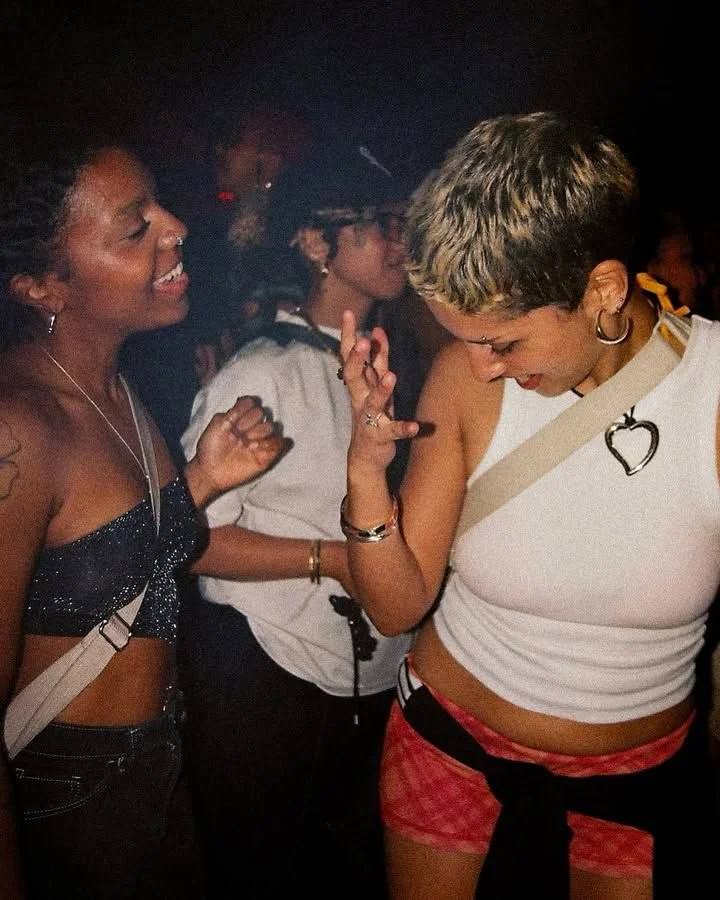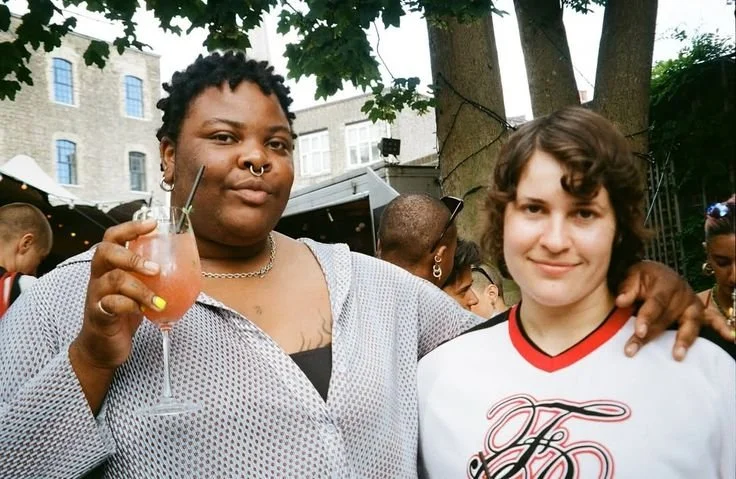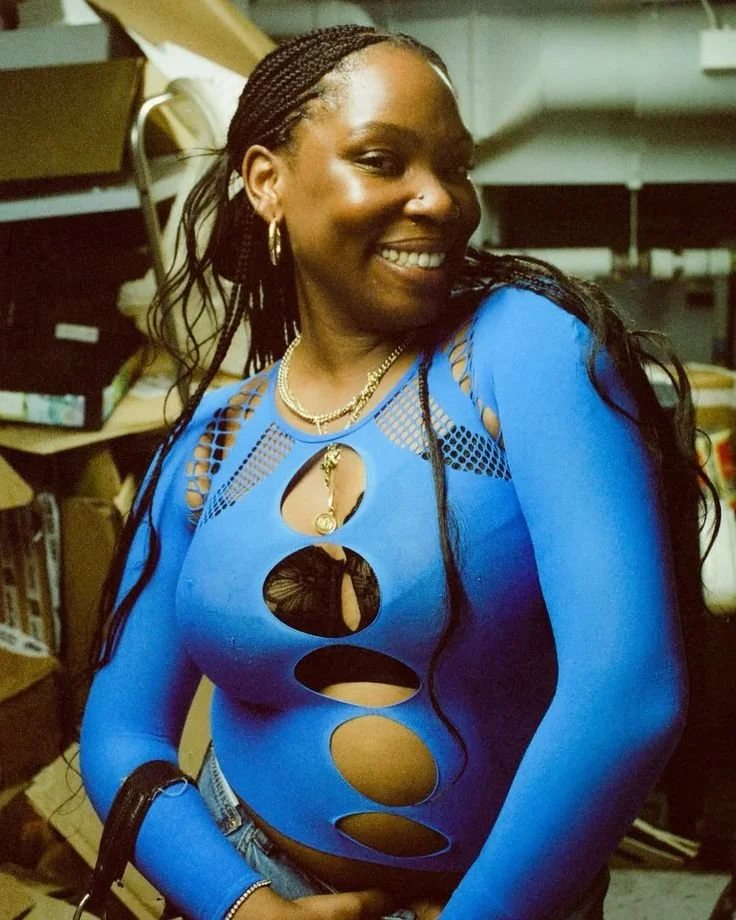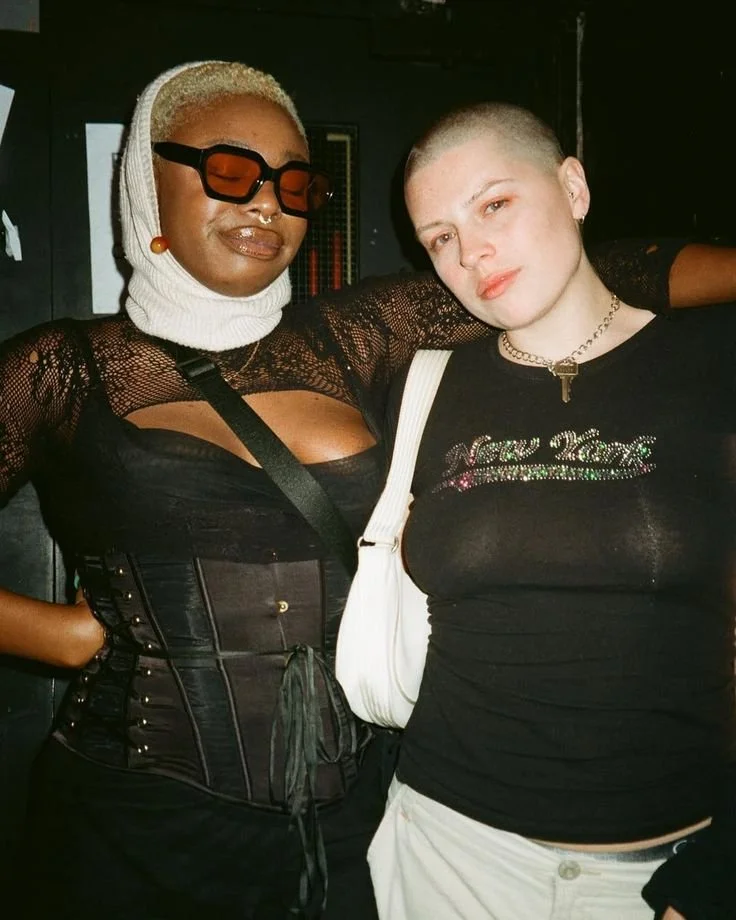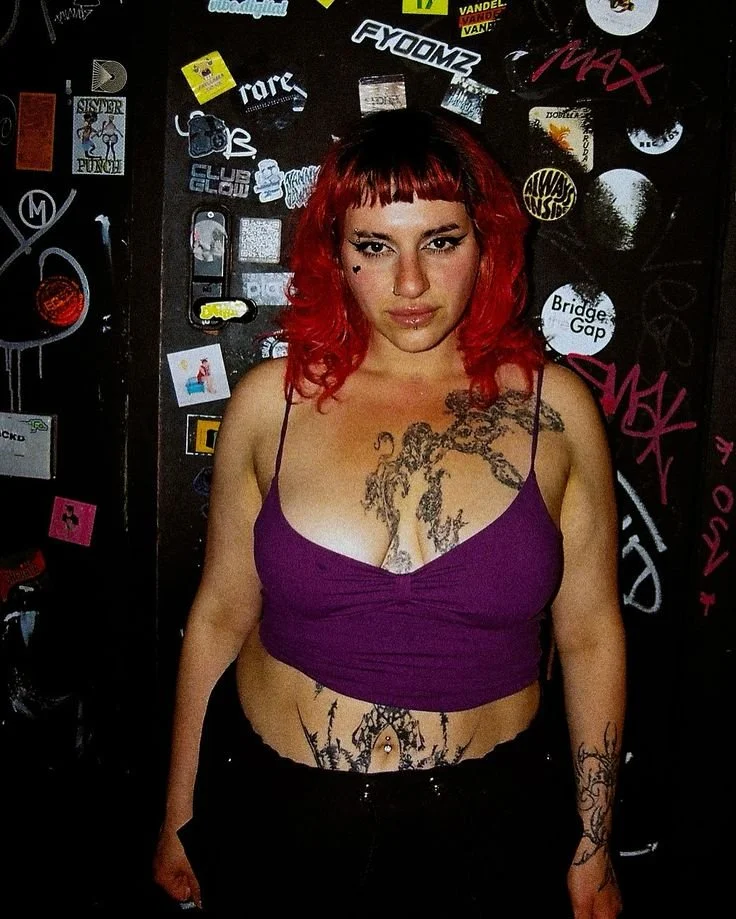What is a FLINTA* Night and Why Does it Feel Like Being The Little Spoon?
DJ and GAYTORADE founder Eula explores why FLINTA* nights offer something no other dancefloor can: sanctuary, community, and the best music you'll ever hear.
The first time i went to a FLINTA* party wasn't long after I'd spent six months in the gender trenches working out I was a girl (or transfem or something 🤷♀️). It also wasn't long after I'd got my first DJ controller. Now I DJ as a job and run a FLINTA* night and mix series, so I think it's fair to say it had a pretty profound effect.
It wasn't until i went back to a cis-het male-inclusive dancefloor that I realised just how blessed the FLINTA* dancefloor is. I was getting shoved and harried. A cis-guy with a thick, white, oversized t-shirt and a fresh skin-fade wafting Dior Sauvage pushed past me to not-dance at the very front. I could feel eyes looking at me kinda weird. Tr**ny clocking eyes. I didn't feel held like I had on the FLINTA* dancefloor. In fact I didn't really feel safe.
Image credit: WET by @saloneb4be__
Even at queer nights that aren't FLINTA* focused, while I've felt generally safe, I haven't felt that same sacredness the FLINTA* dancefloor offers. To the untrained eye, a circuit party and a FLINTA* night might not look that different: sweaty bodies, shaved heads, knock-off balenciaga sunglasses, folks in denim shorts and tank tops making out. Both might look like scenes of hedonism, but the FLINTA* party is in fact a scene of liberation from transmisogyny and patriarchal oppression.
This oppression gives rise to relentless micro-aggressions, which create a persistent unconscious tension. For me as a visible transfem, that means being alert to strangers staring too long, always on guard in changing rooms or bathrooms, unwanted touching on dancefloors, and things as small as wondering if the post office clerk will gender me correctly. In the broader world I think about how I present—wearing clothes and makeup to minimise certain features, or having a really clean shave—not really to pass, but for self-preservation. If you can be interpreted as who you are, you just feel more willing to stay alive, and it lowers your risk of getting hate-crimed if you’re less visibly trans. I'm a dyke, I’m proud to be trans and (when it's safe) I’m happy for people to know that. But I quickly learned you have to have your wits about you if you want to walk around in a dress at night. That’s something cis girls have drilled in from a young age, and it’s strange to learn it first-hand in your 20s.
Image credit: WET by @bernice.mulenga
FLINTA* nights are a space where you can switch off the safety radar that patriarchal dancefloors switch on - I can be butch as hell and not worry about the wrath of transphobes. If someone stares at me a little too long, I’m not wondering if they’re clocking me, I’m wondering if they wanna make out. I’ve heard my POC friends speak about a similar sensation at POC nights, an ability to switch off the safety radar that starts up on predominantly white dancefloors. And it’s such a relief. It feels like being the little spoon: warm, protected, held… loved and cared for by every other party-goer.
Image credit: WET by @bernice.mulenga
If you've not come across the term, FLINTA* stands for Female, Lesbian, Intersex, Non-binary, Transgender, Agender—and don't sleep on the asterisk. It marks the term as incomplete; listing identities is imperfect and never a fixed entity. (Amelie Kahl's article for Gay Times digs into this nuance.) In simple terms: no cis men allowed. While FLINTA* doesn't always mean queer, many FLINTA* nights have a queer focus. The word grew out of ‘70s Berlin feminism, evolving from Frauenräume (women's spaces). In the '90s FrauenLesben (WomenLesbians) was adopted by lesbians experiencing discrimination within Frauenräume. FrauenLesben quickly came to encompass a broader sense of queerness, which included gender nonconformity, becoming FLT (female, lesbian, trans), and has since evolved into FLINTA*. FLINTA* spaces are sites of rebellion and resistance, a history that is inherently political. That history makes me feel protected—and hopeful that there is protection for others who need it.
Image: WET by @oozing_thru
I wish I'd known all that when I was queuing for my first FLINTA* night. I had a quick panic that all 6'2" of my clocky self might be an imposition. Then the buzz-cut-butch-bouncer smiled and called me 'darling', and inside, I saw a couple of other transfem heads bobbing about above the crowd. Within an hour, I felt more welcome than I ever had on any dancefloor. It was kind of an epiphany. I'd heard people call the dancefloor sacred before, but here I finally got what that meant: I felt accepted as one of the dykes. Sure, MDMA and gender-euphoria might have helped, but the glow kept on in the following days even through the comedown.
Running GAYTORADE, we want every FLINTA* person to be able to experience that little spoon feeling. GAYTORADE started as a one-off at Bunker Deptford to raise money for queer migrants. I was invited to DJ by a friend and the energy was so chaotic and beautiful I asked if I could help organise the next one. As an all-FLINTA* team we decided to make it a FLINTA*-first night. We do permit cis-men - although there’s very limited tickets and they cost twice as much as a cis-woman ticket - and so far we’ve only got the cis-men who understand their privilege and respect the space.
Image credit: WET by @bernice.mulenga
The GAYTORADE team have a shared hatred of anyone feeling left out or not cool enough, so we put a ban on seriousness at our parties. As with many other FLINTA* nights it doesn't matter how you dress, or how many FOLD stickers you have on your phone, as long as you're willing to leave your ego in the cloakroom. Theres something so fucking beautiful about seeing an established techno-purist and a 19 y/o dorky (read compliment) t-girl with a Snorlax rucksack both losing their absolute shit to a completely incongruous hardcore edit of Avril Lavigne. Brings a tear to my eye, honestly.
Image credit: WET @saloneb4be__
And the music at FLINTA* nights is always sensational. These grassroots, community-focused events are committed to creating opportunities for marginalised creatives. You hear smaller-name DJs and promoters taking risks on interesting sounds. I rarely leave without hearing something new, something that makes the hairs stand up on my neck, or makes me go 'what the fuck even was that?'. I’m often on the floor for an entire set, only heading to the smoking area to cool down or take a sensory break - not because I want a change of scene.
That’s owed to the diversity of the lineups—you really hear people and their identities through their selections. It’s easy to forget how limited the sonic profile of white-cis-male DJs can be, and how much that sound dominates nightlife. It’s like being a film lover who’s only ever watched Oscar-nominated films—pretty good, broad-ish range, but then imagine getting a MUBI login: suddenly, whole new worlds of languages, styles, and viewpoints appear. Artists who aren’t cis men, who aren’t white, who aren’t from wealth. It's not until you're immersed in the ocean that you can see that you were in a pond before.
And that community focus doesn't just permeate the sound. At FLINTA* events, I’ve seen the most sincere inclusion. I always spot familiar faces and leave with new friends—some I never see again, but a whole lot of them I'm still friends with. Paying for a ticket feels more like supporting something you care about than a transaction. People think about what they’re bringing to the space, not just what they’re getting. There’s no pressure to be the life of the party; your energy can be quiet. You can be at the front lost in music and someone will check in with a simple "just wanted to check you’re good." It’s those tiny gestures that make these spaces beautiful. In a world of constant micro-aggressions, FLINTA* nights offer constant micro-affirmations.
Image credit: WET by @bernice.mulenga
Image credit: WET by @saloneb4be__
How can the broader nightlife community create this feeling? Sadly for my cis-boys out there, I don't think it's possible to recreate for everyone. Liberation is the upshot of oppression. But I do think the broader nightlife scene can approximate that prevailing attitude of mutual aid, and promoters, DJs and party-goers can replicate this if they're serious about community building.
The word ‘community’ gets chucked around a lot in nightlife, but it’s often confused with exclusivity. Much of the time, even with the best intentions, door pickers and vetting systems are just clout-policing dressed up pretty. If there’s clout, there’s an in-crowd, and if there’s an in-crowd, there’s exclusion. In London, creating exclusivity sells tickets and keeps nights afloat. Authentic community building rejects that, but it’s rarely financially viable. It’s a symptom of late-stage capitalism that true community-led nightlife almost has to be a grassroots labour of love to survive.
Image credit: WET @saloneb4be__
But here's some things I’ve seen actually work: Having a couple of open decks spots at the start of lineups (so newer DJs gain confidence and exposure on their own terms). Having diverse lineups as a standard. Using accessible venues. Ticket tiering that recognises marginalisation and privilege. Having a welfare policy and welfare staff… This last one has become a standard for queer parties, and it does genuinely prompt people to be thinking about those around them.
Real community building is about attitude. It's hard work that takes time. It means going into marginalised communities, making genuine friendships, earning trust by being sincere and supportive. It means uplifting those who need it most. If you're out there doing that work, the folks who come to your party will care about your party. And that's when you get the little-spoon feeling.
*Note, this was written before MUBI accepted funding from Sequioa Capital.
Image credit: The Future is FLINTA* tees - available in multiple colourways, printed on black, blue and white baby tees.
Eula’s FLINTA* and FLINTA*-first party picks:
Plastyk - has anarchy and resistance at its core. Diverse lineups of hard selectors putting out their wildest shit. Expect techno, punk, breaks, dubstep, jungle and even a peppering of EDM (cos Karli iykyk). Black trans women go free. I went after the Dyke March last month, and it might be the best clubbing experience I've had this year. The floor was literally slippery with dyke sweat 🥵.
Femme Fraiche - fun, bouncy goodness running takeovers across London venues.
Mothership - trans-led haven. Joyous and camp doesn't mean you can't go hard.
House of The Goddess - scratches that housy itch reallllll nice
Habibti Nation - platforming SWANA + arab FLINTA* performers and delivering hard multigenre beats from the diaspora and beyond.
Slag Land - cunty bimbo sluts to the front. Expect booty shaking fast, dumb tunes
Strapped - East London dyke party. Ambitious events with performers and DJs.
Stripped Sets - for my regional bitches. Norkfolks finest in FLINTA* community nightlife.
Sistermatic - 40 years of BIPOC led FLINTA sounds. Need I say more.
Charje World - pleasingly unhinged energy which centres fashion without creating exclusion. expect to get fast and silly and meet a cute anime girly (gender-neutral). I got so in to the spirit of this party, I left with a tooth gem 🙂
WET - established South London dyke night putting BIPOC folks to the front.
Aphrodite Audio - Cunty Cornish crones (gender-neutral) lock in for genuinely unhinged nonsense.
Loud and Clear - Housy sweethearts. I heard they give their DJs flowers after their sets and I almost cried.
Jungyals and Gays - Jungle-first but aggressively multigenre and making waves of joy in London
Polka Dot Disco Club - cute and bouncy energy up in Glasgow
Dykes on Decks - an established name on the scene. Gorgeous underground energy.
Vinyl Bitch - for my vinyl-purist huns (gender neutral) out there. Real community stuff pushing a new wave of FLINTA* turntablist with open decks and club nights.


